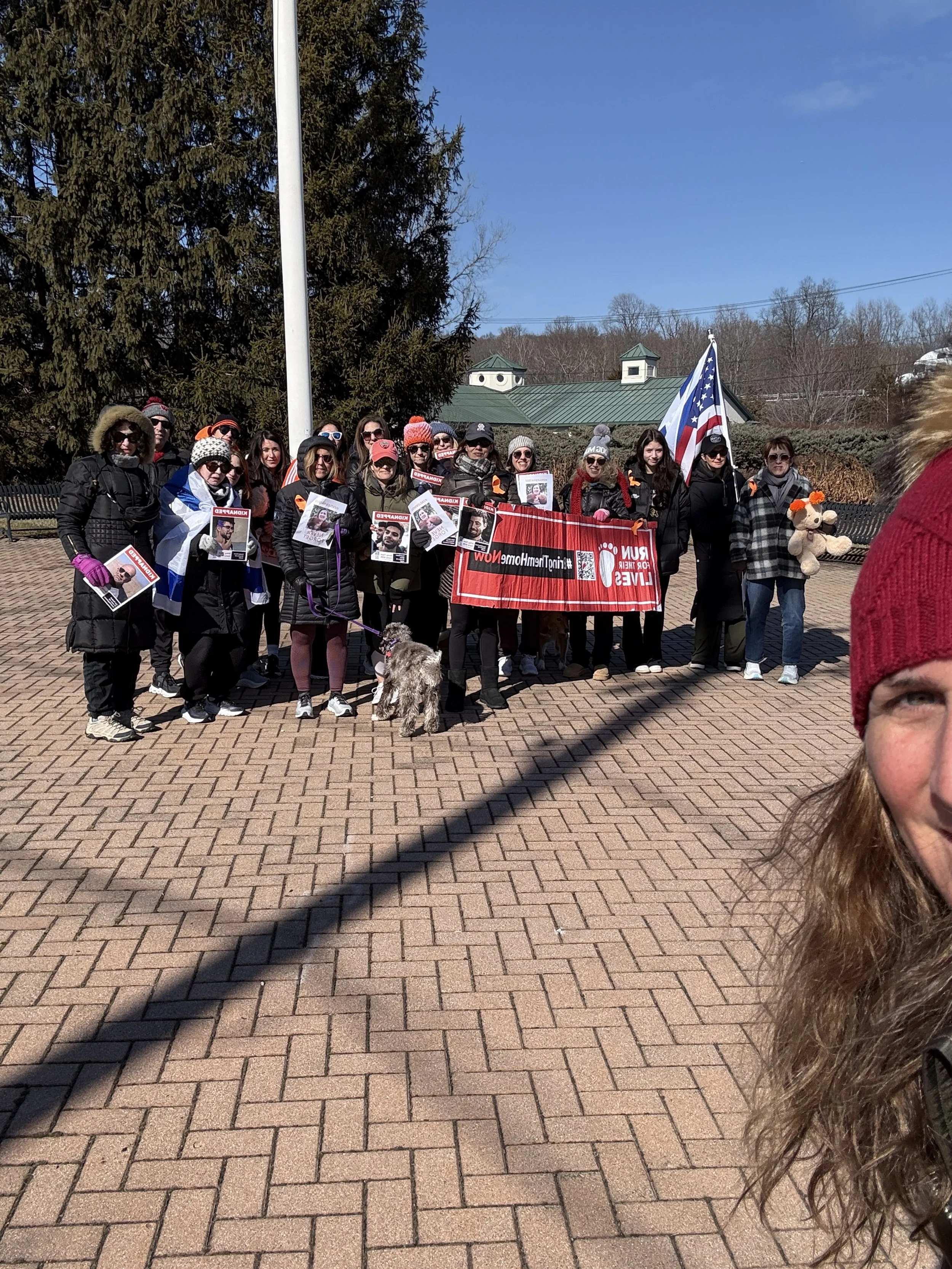Run for Their Lives Feb 23: Memorial for Shiri, Ariel & Kfir Bibas and Oded Lifshitz
By Michal Levison
This week has been a difficult one. On Thursday, the bodies of Oded Lifshitz, Ariel and Kfir Bibas were returned to Israel (along with an anonymous body purported to be of Shiri Bibas). We watched in horror as Hamas paraded their coffins in a celebration in Gaza filled with men, women and children, joyous music, candy and a carnival-like atmosphere before the bodies were transferred to Israel. The day got worse as the forensics team discovered that the body in Shiri’s coffin was not hers (nor did it correspond to any Israeli taken hostage). And still worse as news of a planned terrorist attack gone bad unfolded. Our hearts have been broken so many times these past 16 months. To find out the babies were murdered with bare hands a month into their captivity was almost too much to bare.
Their image has been on our minds since October 7th. A mother, hugging her children tightly to her chest. Scared. Shaking. But never loosening her grip. And those heads. Small and ginger. Grasping onto their mother and each other. A mother’s love that enveloped them all. But who was there for her? Our breaths were hitched in wild anticipation of their release. Now our souls cry for a mother lioness who deserved a better ending to her story.
And then we got six hostages back yesterday. Omer Shem-Tov, Omer Wenkert, Eliya Cohen, Hisham al-Sayed, Avera Mengistu, and Tal Shoham. Watching their reunions with family members lifted our spirits. And that is that whole of Judaism - hope in the face of abject desolation. Our whole existence is bound by our ability to create habits that defeat despair.
Rabbi Sacks wrote, “To be a Jew is to be an agent of hope in a world serially threatened by despair. Every ritual, every mitzvah, every syllable of the Jewish story, every element of Jewish law, is a protest against escapism, resignation or the blind acceptance of fate. Judaism is a sustained struggle, the greatest ever known, against the world that is, in the name of the world that could be, should be, but is not yet. There is no more challenging vocation. Throughout history, when human beings have sought hope they have found it in the Jewish story. Judaism is the religion, and Israel the home, of hope.
It is no accident that so many Jews are economists fighting poverty, or doctors fighting disease, or lawyers fighting injustice, in all cases refusing to see these things as inevitable. It is no accident that after the Holocaust Jews did not call it Al Naqba, nursing resentment and revenge, but instead turned to the future, building a nation whose national anthem is Hatikvah, “the hope.” It is no accident that Judaism has been opposed by every empire that sought to deny people the freedom to be equal-but-different. It is no accident that Israel is still today the only free society in the Middle East.”
There’s a story of a man who saw children starving, injustice flourishing, and violence in the streets. He cried out, “Lord, the world is in such a mess—everything seems wrong. Why don’t you send someone to help and change the world?” The voice of the Lord answered, “I did send someone. I sent you.”
The world is a mess and someone has been sent to change it. You. Us.
May you never lose hope. May you be blessed with the ability to say, “not yet.” May you have the strength and courage to continue to build the reality you yearn for.
Easier said than done, right? So how do we unlock optimism when there is so much doom and gloom? I’ll give you a few quick interventions you can practice to increase your optimism and hope. Yes, these are learned or learnable traits. Optimism isn’t about pretending the struggle doesn’t exist. It’s about believing in your ability to move forward despite it. You are not necessarily born with them. So, here goes:
1) Practice gratitude to reset your mindset. Gratitude is one of the most powerful tools for optimism. When you’re struggling, take time to reflect on what’s going well or what you’re grateful for so you can shift your perspective and reduce stress. When you look beyond immediate frustrations and see the bigger picture, you increase your optimism.
2) Reframe negative thoughts. It’s very easy to spiral into negative thought loops. Optimism teaches us that setbacks are opportunities to adjust and improve. When you have a negative thought, write it down and reframe it into a constructive question. Instead of this isn’t going to work, think what can I learn from this? What’s another approach?
3) Do something good for others. When we help others, it not only helps repair the world, it gives us a sense of meaning and purpose, connects us to something bigger than ourselves and makes us more resilient.
We continue to hope even when we have no promise of when the world will be whole again, or if we will ever achieve peace. Our Jewish tradition teaches that we can and we must overshadow the darkness. Regardless of how things turn out , we continue to hope, as we continue to work towards making the world more whole. Even in unimaginable darkness and despair, we must continue to be the light.

